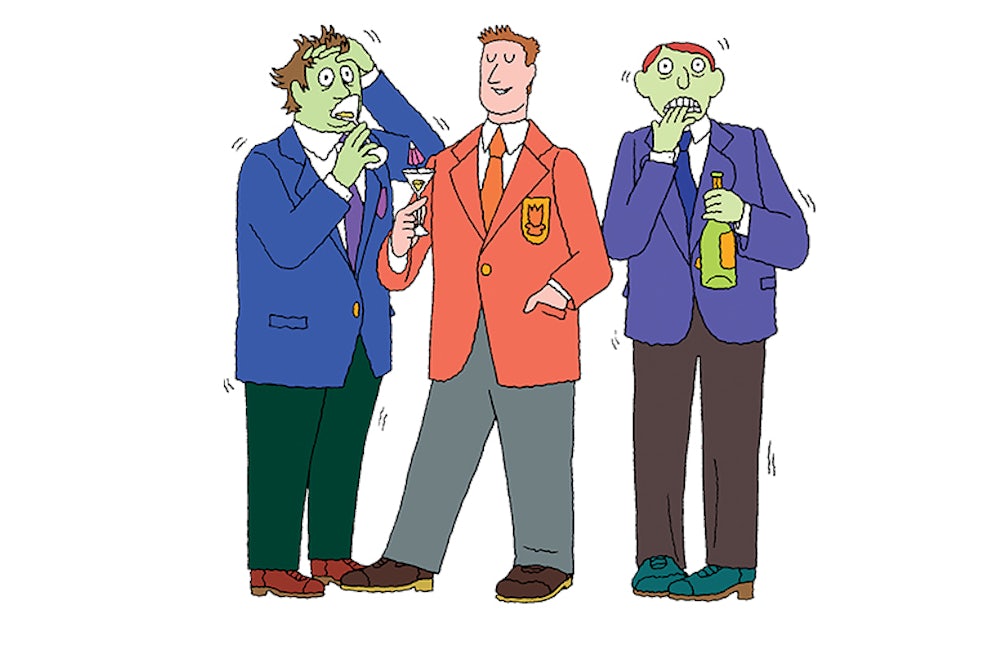It’s been a few weeks now since Susan Patton—the veteran human resources consultant who made sure to tell the world she went to Princeton, and also made sure to declare that her two sons did (both the older, married one who she feels “could have married anyone” and his single younger brother)—wrote her blunt letter to the college paper there. In it, she urged young female Princeton Tigers (Tigresses? I think it fits here) to lock in husbands while they’re still students at what just happens to be my alma mater. “Simply put,” the get-real Mrs. Patton advised her occasionally imprudent sisterhood, “there is a very limited population of men who are as smart or smarter than we are. And I say again, you will never again be surrounded by this concentration of men who are worthy of you.”
Her reasoning—assuming you bought her premises that Princeton men are singularly fit to win the Darwinian battle of life on Earth and are predisposed to share the spoils with their original spouses and their offspring, and further assuming that you bought her other premise that the premiere assortment of Princeton men is found on the university’s actual campus rather than, say, the few blocks surrounding Wall Street or in Davos hotels during Global Soft Power Week—was lucid, sound, and well-nigh unassailable. It was also, at least to some folks, quite offensive.
Because the offended in our day and age tend always to be offended for the same reasons—feminist reasons, populist reasons, needing-to-sound-unique-and-thoughtful reasons—there’s little need to review specifically the varied objections to the The Tigress Manifesto, which resembles, when studied closely, an investment letter aimed at young speculators in human equities. What is worth some pondering, however, is the effect of the controversial tip sheet on its most relevant secondary audience: people like me, or like my younger self. Heterosexual male Princetonians. The high-flying objects of alpha-chick desire.
Speaking broadly and from my own experience (because that’s what Ivy League grads are apt to do, and what non-Ivy grads are apt to let us do), the Princeton Man is organically aware of his own extraordinary value in most American social markets, including the romance-and-marriage market. For this, we can thank Princeton dropout F. Scott Fitzgerald, a holder of the university’s highest informal honorary degree in Comparative Collegiate Narcissism. In This Side of Paradise and his short stories, Fitzgerald burnished the notion that Princeton males are chivalrous, charming, worldly, fun when drunk, and rather ambitious, although not too ambitious. This may or may not have been true when he first said it was, but it has surely been true ever since then, as Princeton men, whatever else they are, are ten-finger clingers to self-serving myths.
This inclination to embrace our dream selves is what distinguishes us from Yale men, those cold-blooded, sly, manipulative strategists, and also from brash, imperious Harvard men. It’s why, when we settle down, we’re such good husbands. We know to clothe the real in the ideal.
This trait also functions to make us skilled deniers of insulting, disturbing, empirical evidence, such as the fact that Fitzgerald didn’t graduate and was such a fun drunk he became an alcoholic. The same things are true of Eugene O’Neill, our other bard. What’s more, of the three U.S. presidents we’ve spawned, the most famously virile, John F. Kennedy, transferred to Harvard during his freshman year. And then there was handsome Dr. Jeffrey MacDonald, whom other Princeton men don’t mention much, particularly around cute Princeton women. He murdered his wife and two daughters, which is bad, but what’s much worse is that he was convicted, possibly due to his elitist tin-ear for the lingo of the supposed hippies he lamely blamed for the attack: “Acid is groovy. Kill the pigs.” Embarrassing. A real Princeton Man would have bravely confessed his guilt, and then added that he was drunk.
Still, Mrs. Patton, the Olympian Dear Abby whose loins brought forth two of our irresistible cohort, strongly believes we’re worth the risk. And because we do too, and would have the world agree, we’re grateful for her purportedly objective appraisal of our future marital worth. I—twice divorced and currently engaged to a younger woman who went to Harvard but had the good sense not to throw in with some boy there, back when, as Patton would have it, she had her pick of them (before they dispersed and were set upon by showgirls)—am grateful in the extreme.
Almost as grateful, I wager, are the young fellows who read her letter in their college paper and suddenly ballooned in self-esteem as they realized just how much extra leverage they could exert in the campus dating scene. The Princeton Man is an opportunist, see, which is why he got into Princeton in the first place, why Mrs. Patton deems him a hot property, and why (bad news, you pretty, scheming sophomores in your fetching lacrosse shorts and black cardigans) he won’t be cornered. He won’t sell himself short. And herein lies Mrs. Patton’s great mistake, which I’ve waited for weeks now for someone to point out but knew, as a Princeton Man, that no one would, leaving to me the job of stating the obvious: You should have kept your investment letter private. If it’s women’s interests you truly wished to serve, you should have addressed them discreetly, girl to girl, not on the floor of the Ivy League Stock Exchange, which—don’t you know this?—still belongs to guys.
